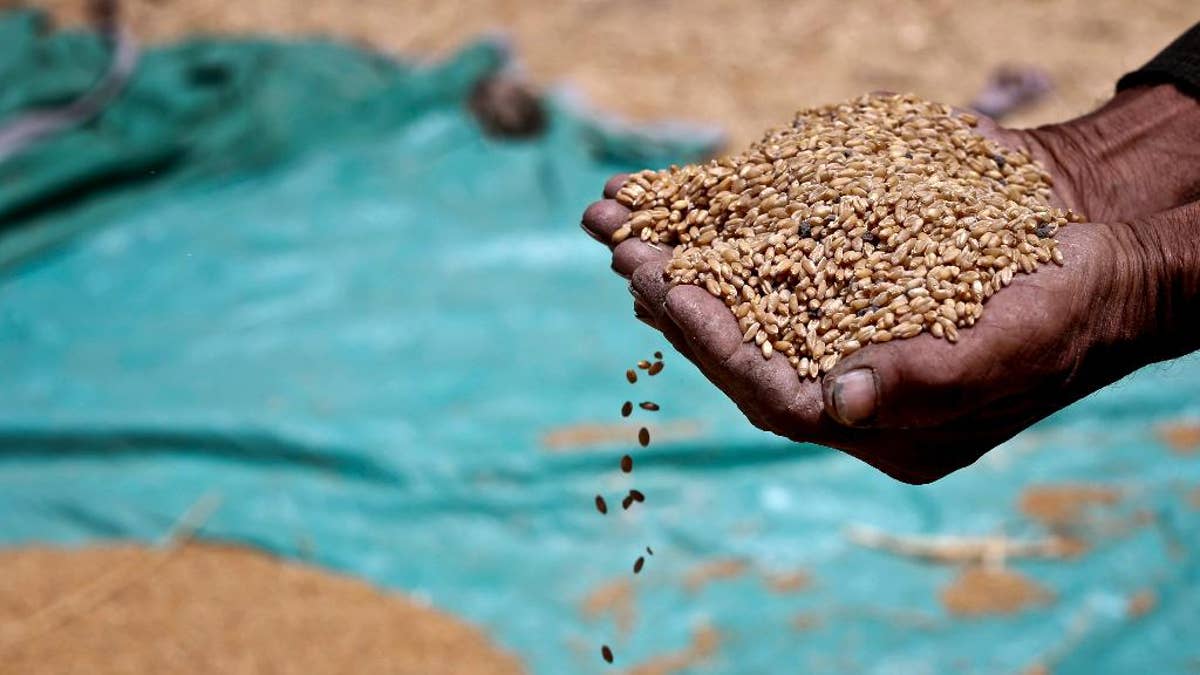
FILE - In this Sunday, May 19, 2013 file photo, a farmer holds grains of wheat in his hands on a field in Fayoum, 60 miles, (100 kilometers), south of Cairo, Egypt. Egypt's farmers have begun the annual wheat harvest. This year, it comes as the government is trying to rein in its decades-old policy of subsidizing bread with a new electronic smart-card system. The minister of supply says that the new system will save the government money and better target the country's poorest. He also says that Egypt, the world's largest importer of wheat, will continue to rely on foreign sources for the staple crop. Unrest in Ukraine has pushed up wheat prices worldwide in recent months. (AP Photo/Hassan Ammar, File) (The Associated Press)
For girls and young women, getting a lot of fiber could pay off decades later with lowered risk of developing breast cancer, according to a large U.S. study.
Researchers analyzed data on more than 44,000 women participating in a long-term study and found those who ate the most fiber during high school and early adulthood were about 20 percent less likely to develop breast cancer by middle age than those who ate the least fiber in their youth.
There's reason to believe that dietary fiber could affect developing breasts in ways that impact long-term cancer risk, but no one has ever followed-up over such a long period, the authors note in the journal Pediatrics.
"Most of the studies that evaluated association between dietary fiber intake in midlife or later, have not noted any significant association," said lead author Maryam Farvid of the Harvard T.H. Chan School of Public Health in Boston. "Therefore, it seems high-fiber diet in early life would be important in terms of breast cancer prevention."
Foods high in fiber contain many other nutrients, which may have played a role, but most known breast cancer risk factors as well as the overall quality of the women's diets were taken into account, Farvid said. Yet the association with fiber remained.
The researchers used data from the Nurses' Health Study II, which included more than 90,000 premenopausal women who completed a dietary questionnaire in 1991, when they were 27 to 44 years old. Eight years later, 44,263 of them also completed a questionnaire about their diets when they were in high school.
Among women with high school dietary data, there were 1,118 cases of invasive breast cancer by 2011.
The study team divided women into five groups, from highest to lowest intake of dietary fiber when they were teens and also in 1991, when they were young women.
Those who ate the most dietary fiber when they were young were 16 percent to 20 percent less likely to develop breast cancer than those who got the least fiber.
This was true for soluble fiber in foods like oat bran, which attracts water and slows digestion, and insoluble fiber in foods like wheat bran, which adds bulk to stool and helps food pass more quickly through the digestive tract.
In early adulthood, women who got the least dietary fiber consumed an average of 12 grams per day, compared to 26 grams per day for those who got the most fiber, and amounts were similar among the teens.
While the average American today eats 10 to 15 grams of fiber daily, most should be getting 20 to 35 grams daily, according to the National Library of Medicine.
"Our findings show that each additional 10 grams per day increase in fiber intake during adolescence reduces risk of breast cancer by 14 percent," and getting the recommended 25 to 30 grams per day would decrease breast cancer risk by 30 percent, Farvid said.
"Twenty-six grams of fiber a day is not that much," and that amount was tied to a significant decrease in breast cancer risk, said Dr. Kimberly L. Blackwell of Duke University Medical Center in Durham, North Carolina, who coauthored a commentary on the new results.
"I'm a breast cancer doctor and this is a very important finding," Blackwell told Reuters Health. "I'm asked by breast cancer survivors about what they can do to lower their kids' risk," and there hasn't been much to offer in response in the past, she said. "It will change what I tell my patients."
Fiber intake influences circulating hormone levels, and hormone levels during the adolescent period of breast development may impact later breast cancer risk, she said.
Women who get more fiber as young adults also tend to carry healthy eating habits into later life, she noted.
Ideally this fiber comes from fruits and vegetables, but it can also come from cereals or fortified foods, Blackwell said.
"We recommend that parents of young daughters provide plenty of high-fiber foods at home and make sure their children eat enough fruits and vegetables, whole-grain pasta, dark bread or brown rice, legumes and nuts in their diet," Farvid said.
